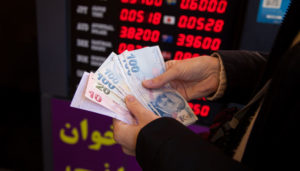

10.01.2022 – The Lira short rocket is likely to ignite its final stage shortly. One blog sees USD/TRY crashing to over 100 as the central bank runs out of foreign exchange to intervene.
ZeroHedge recently commented, “The only question is when will Turkey’s FX swaps stop working – that’s when the lira will reprice from 13 to 100+ in a millisecond.” According to the financial blog, Turkey’s gross FX reserves do stand at $110.9 billion. However, net reserves – the stock minus liabilities – now stand at only $8.6 billion. This means that Ankara has only two to three weeks left before it loses control of the lira.
Mega-inflation and low interest rates
There is no reason for a turnaround. In December, year-on-year inflation jumped to 36.08 percent – the highest level in about two decades. Even the most pessimistic analysts had expected only 27 percent. Producer prices even increased by 79.89 percent in December. No matter -the Turkish central bank lowered under pressure of the Turkish president Recep Tayyip Erdogan the key interest rate. It is now at 14 percent, so investors fled the currency. The USD/TRY rushed down to about 18.
The state takes over currency losses
Ergo, Ankara intervened shortly before Christmas by offering deposit accounts with foreign currency as compensation for lira losses. The government thus assured companies that it would assume exchange rate risks. This is likely to place an enormous burden on the state budget. Target achieved: The lira fizzled upward to $10.6. A painful short squeeze, in other words.
Voodoo monetary policy
Goldman Sachs commented that the deposit guarantee does not address the actual fundamental reasons for the currency’s crash. We add: The reason is Erdoganomics – the voodoo belief that low interest rates support a currency. In addition, a bloated state budget that finances military escapades, for example, via the printing press. Then there is the corona dent in tourism as a foreign exchange earner.
Left pocket, right pocket
At the end of 2021, the Turkish central bank then caused confusion again: It allegedly posted a daily profit of $10 billion. According to Bloomberg, on Dec. 30 the institution had still reported a loss of around 70 billion liras – or about $5.2 billion. A day later, the balance sheet stood at 60 billion in the black. There was no explanation for the sleight of hand. The action was discovered by two opposition politicians, Ibrahim Turhan and Kerim Rota. They assume that the central bank simply sold dollars to the Ministry of Finance. We suspect that an injection of money from China or Russia could also be behind the unexpected turn of events.
Thou shalt not sell lira
Either way, it doesn’t inspire confidence. In the meantime, however, we have returned to around 14. Now, the Turkish authorities now announced that they want to keep a register of everyone who buys large amounts of foreign currency. In other words, selling Turkish lira. According to Bloomberg, the central bank has instructed commercial banks to report all major transactions.
Our conclusion: unfortunately, there is much to suggest that the Turkish lira will become a worthless monopoly. But perhaps this skeptical outlook is just the typical contra-indicator for the turnaround. So if you believe that Erdogan is changing course and that the lira is now gaining, get in now. Bernstein Bank wishes good luck!
Important Notes on This Publication:
The content of this publication is for general information purposes only. In this context, it is neither an individual investment recommendation or advice nor an offer to purchase or sell securities or other financial products. The content in question and all the information contained therein do not in any way replace individual investor- or investment-oriented advice. No reliable forecast or indication for the future is possible with respect to any presentation or information on the present or past performance of the relevant underlying assets. All information and data presented in this publication are based on reliable sources. However, Bernstein Bank does not guarantee that the information and data contained in this publication is up-to-date, correct and complete. Securities traded on the financial markets are subject to price fluctuations. A contract for difference (CFD) is also a financial instrument with leverage effect. Against this backdrop, CFD trading involves a high risk up to the point of total loss and may not be suitable for all investors. Therefore, make sure that you have fully understood all the correlating risks. If necessary, ask for independent advice. CFDs are complex instruments and are associated with the high risk of losing money quickly because of the leverage effect. 68% of retail investor accounts lose money trading CFD with this provider. You should consider whether you understand how CFD work and whether you can afford to take the high risk of losing your money.
